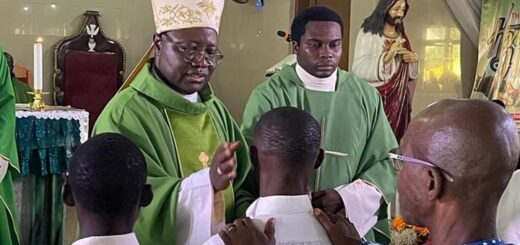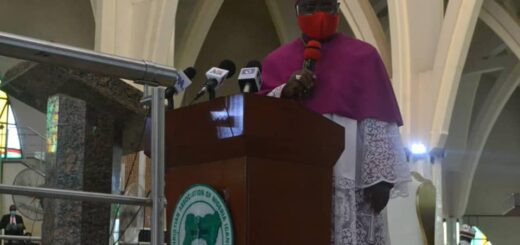Three Things about the Kingdom
by ARCH BISHOP · November 8, 2020
32nd Sunday Homily by Archbishop I. A. Kaigama at Christ the King Parish, Kurudu, 8th November, 2020.
Readings: Wisdom 6:12-16; Ps. 62(63) 2-8; 1 Thessalonians 4:13-18; Matthew 25:1-13
The Church in celebrating the feast of All Saints on 1st November, reminds us of our call to live holy lives in this world so that we can live with God after, because our permanent citizenship is in heaven (cf. Phil. 3:20). Followed by the feast of All Souls, we are reminded of the sad and inevitable reality of death, but our hope is that we shall see God face to face (cf. Rev. 22:4). For our brothers and sisters in purgatory, we are encouraged to fervently pray the Lord to bring them into His heavenly company. Because of the Corona Virus pandemic, the Holy See has extended the plenary indulgence for the dead throughout the month of November. Do not forget your communion with the dead by praying for them.
Three things come to mind in the readings today:
Acquire Wisdom:
In the first reading (Wisdom 6:12-16), wisdom is depicted as a woman. It only takes a wise person to go in search of her so that one is better equipped to face the struggles and challenges of life. King Solomon’s legendary wisdom was a gift he asked for from God which enabled him to serve his people by making wise choices (cf. 1 Kgs 3:1ff).
Wisdom here does not refer to intellectual prowess or the crafty and dubious ways of manipulating people; fraudulently exploiting socio-economic systems and institutions, but the wisdom to work towards better standards of living and values that bring people together in love, friendship and harmony.
The parable of Jesus concerning the ten virgins (Matthew 25:1-13) presents the virgins in two categories. The first group of “wise” virgins, foresaw that the waiting period for the bridegroom might be prolonged and so carried with them extra oil. The second group did not think of this, and at the bridegroom’s arrival, found their lamps flickering and they were unable to replenish their supply of oil. The five virgins considered wise represent those believers who are ready to live a life of faith and adherence to divine ordinances. The five foolish virgins represent those unprepared Christians who hear the word of God but fail to live out the Gospel values (cf. Mt. 13:3-7).
Be Ready and Alert:
As we draw close to the end of the liturgical season, and the end of the year, our readings remind us of our own mortality and the passing nature of this world. Jim Reeves sings, “This world is not my home….”
We are challenged to carry out a reality check of how prepared we are for the ‘four last things’ – death, judgment, heaven and hell; to be alert and to keep the light of faith, hope and love burning brightly in our lives. Some Christians become indifferent, dull and negligent and it can be said that their lamps are without enough oil or no oil at all.
The lesson to learn from the action of the wise virgins refusing to give their oil to the foolish virgins is that salvation is not something we can hand over to another like an inheritance. It is not transferrable. We have to work out our salvation with fear and trembling (cf. Phil. 2:12).
Be Active in the Kingdom that is Already but not Yet:
Today, the Church wants us to reflect on how to allow the light of Christ shine in our existential situations, so that the Kingdom of God will already start manifesting. We should not be distracted by human calculations. Christ will surely come and only those who are ready with their lamps burning will join in the festive procession to the realm of glory.
St. Paul in the second reading (1 Thessalonians 4:13-18) encourages us not to grieve too much about those who have died. Because of their good deeds they will be granted kind admittance in the wedding banquet of the Lord. Instead of worrying so much about them, we pray for them and worry rather about spending our time on earth productively; to be worshippers of the Father in spirit and in truth; to shun superficial Christianity, as not all who say, “Lord, Lord,” will enter the Kingdom of God (cf. Mt. 7:21). Jesus cautions us to prepare, since we do not know the day or the hour of His coming. We need to keep refilling our lamps with the oil of prayer, the word of God and the Eucharist, especially in our contemporary world with a severe shortage of the oil of forgiveness, kindness, patience, sympathy, friendship and the lack of the oil of good works and faithful discipleship.
To all our young people who are aggrieved and dissatisfied with their socio-economic conditions, I enjoin you not to give in to despair. Do not let your hope of a better tomorrow die off. Put your hope in Jesus who never fails. It is better to die hoping than to die hopeless. Remember also the exhortation, “… if anyone is not willing to work, let him not eat” (2 Thess. 3:10).
In conclusion, we ask our Mother Mary whom the Church addresses as “our life, our sweetness and our hope,” to intercede for us that we may live and die in the hope that never disappoints.
God bless you Fr. Francis Odigbo, OCD, and all your beloved parishioners.




